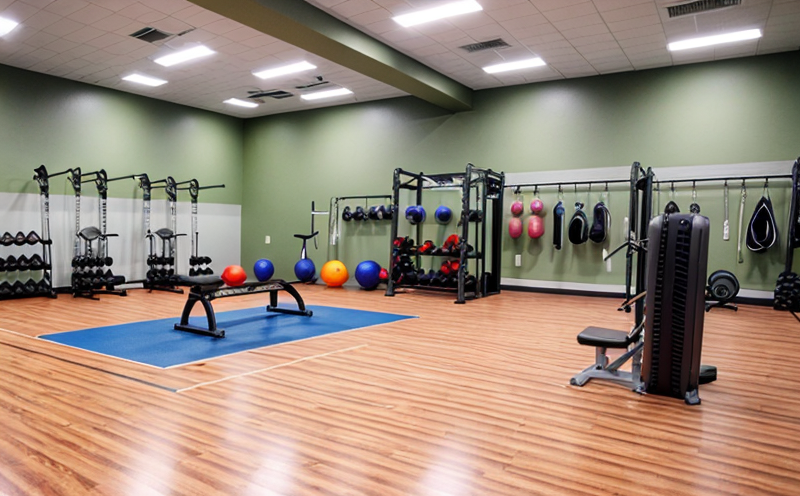Cable Strength Testing in Fitness Machines
When it comes to fitness machines, one of the most critical components is the cable. The strength and durability of these cables are paramount to ensuring user safety and equipment longevity. Cable strength testing ensures that each cable can withstand the rigorous demands placed on them during use. This service is crucial for manufacturers who want to meet regulatory standards, enhance product performance, and maintain a positive brand reputation.
The process involves subjecting cables to various stress tests designed to replicate real-world usage conditions. For instance, cables are often subjected to cyclic loading, where they are repeatedly pulled and released to simulate the constant motion during workouts. This testing helps identify any weaknesses in the cable structure that could lead to failure under normal operating conditions.
Another aspect of this service is ensuring that the cables meet specific industry standards such as ASTM F2657 for exercise bicycles or EN 957-3 for resistance machines. These standards provide a benchmark for acceptable performance, helping manufacturers ensure their products are safe and reliable.
The importance of cable strength testing extends beyond just safety; it also impacts the overall user experience. Stronger cables contribute to better machine stability, which in turn enhances workout effectiveness and reduces the risk of equipment damage. For quality managers and compliance officers, this service ensures that all components meet regulatory requirements, thereby reducing liability risks.
In addition to its role in ensuring safety and performance, cable strength testing plays a key part in product development. R&D engineers rely on this data to refine designs and improve the durability of cables. This iterative process helps manufacturers stay ahead of competitors by offering products that are both safer and more reliable.
From a sustainability perspective, robust cables contribute to longer equipment life cycles. By reducing the frequency of replacements, fitness facilities can minimize waste and operational costs. Moreover, testing ensures compliance with environmental regulations, which is essential for maintaining a positive corporate image in an increasingly eco-conscious market.
In terms of competitive advantage, cable strength testing allows manufacturers to differentiate their products by emphasizing durability and reliability. This not only enhances consumer trust but also opens up opportunities for premium pricing. In the broader context, this service supports a sustainable fitness equipment industry by promoting innovation and responsible manufacturing practices.
Why It Matters
The importance of cable strength testing cannot be overstated in the realm of fitness machines. Safety is paramount, and any failure in a cable can lead to serious accidents. Ensuring that cables meet or exceed industry standards not only protects users but also shields manufacturers from potential legal issues.
- Regulatory Compliance: Adhering to standards like ASTM F2657 and EN 957-3 ensures compliance with international regulations, which is essential for market access in different regions.
- User Safety: Strong cables prevent accidents that could result from sudden failure during use. This enhances user confidence and satisfaction.
- Product Lifespan: Robust cables contribute to the longevity of fitness equipment, reducing the need for frequent replacements and minimizing waste.
Additionally, cable strength testing is crucial for product development. Engineers can use test results to identify areas for improvement and innovate new designs that meet both performance and safety standards.
Environmental and Sustainability Contributions
- Eco-Friendly Equipment: By ensuring cables are strong enough to last longer, manufacturers contribute to the production of eco-friendly fitness equipment. This reduces the environmental impact associated with frequent replacements.
- Resource Efficiency: Stronger cables mean that fewer resources are needed for manufacturing and replacement, leading to greater efficiency in resource use.
The testing also supports sustainable practices by ensuring that products meet strict standards related to energy efficiency and material composition. This helps fitness equipment manufacturers align with broader sustainability goals and contribute positively to the environment.
Competitive Advantage and Market Impact
- Differentiation: By investing in robust cable strength testing, manufacturers can differentiate their products from competitors by emphasizing reliability and durability. This is particularly valuable in a crowded market where product quality is a key differentiator.
- Premium Pricing: Products that meet stringent standards often command higher prices due to the perceived value of enhanced safety and longevity. This can translate into increased profitability for manufacturers.
- Customer Loyalty: Satisfied customers who experience safe, reliable workouts are more likely to become loyal patrons, recommending products to others and contributing to positive word-of-mouth marketing.
In the broader market context, cable strength testing supports a shift towards more sustainable fitness equipment manufacturing. By leading in this area, manufacturers can influence industry standards and contribute to a healthier ecosystem for all participants in the sector.





